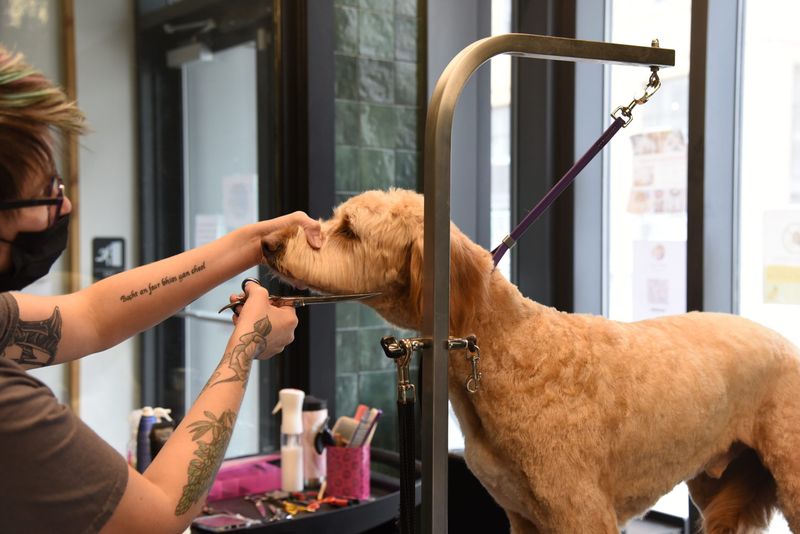Owning a mixed-breed dog can be a rewarding experience; they often come with unique personalities and traits. However, potential drawbacks may arise. While mixed-breed dogs can offer companionship and joy, it’s essential to consider specific challenges that may not be immediately obvious. From unpredictable sizes to potential health issues, these factors could affect your pet ownership experience. Understanding these aspects can help you make an informed decision about owning a mixed-breed dog. Here are 15 potential drawbacks that every potential owner should be aware of.
Unpredictable Size
Imagine adopting a small puppy, only to find it growing into a large dog unexpectedly. Mixed-breed dogs may not have predictable growth patterns, leading to potential space issues. This unpredictability can be charming to some but challenging for those living in compact spaces.
Unknown Health Issues
While purebred dogs are known for certain health predispositions, mixed-breeds can present unknown genetic surprises. Owners may face unexpected health issues due to the diverse genetic makeup, necessitating regular veterinary check-ups. This uncertainty can lead to increased stress and financial strain.
Behavioral Variability
Mixed-breed dogs can exhibit a wide range of behavioral traits drawn from different breeds. This variability might lead to unpredictable temperaments, making training more challenging. Families seeking specific behavior traits may find it difficult to manage such unpredictability in their pets.
Possible Allergies
Allergies can be a concern for mixed-breed dog owners, as their coat types and shedding levels are unpredictable. People with sensitivities may experience unexpected allergic reactions, necessitating a trial period before adoption to ensure compatibility.
Training Challenges
Training a mixed-breed dog can be a unique challenge due to their diverse genetic backgrounds. Their different breed traits can lead to inconsistent responses to common training techniques. Patience and adaptability are essential for owners to effectively train their mixed-breed companions.
Limited Breed-Specific Support
Unlike purebred dogs, mixed-breed dogs do not have specialized clubs or groups that offer dedicated support and resources. This lack of community can make it difficult for owners to find help or share experiences specific to their dog’s needs.
Adoption Uncertainty
Adopting a mixed-breed dog involves uncertainty regarding its future size, temperament, and health. This uncertainty can deter potential adopters who prefer predictability, leaving many mixed-breed dogs waiting longer for forever homes.
Unpredictable Lifespan
The lifespan of a mixed-breed dog can be uncertain, influenced by its genetic diversity. This unpredictability can affect long-term planning for pet owners, who must be prepared for both longevity and potential health issues that arise with age.
Potential Legal Restrictions
Some areas have breed-specific legislation, which can affect mixed-breed dogs that resemble banned breeds. Owners may face unexpected legal challenges and restrictions when living in certain regions, impacting their ability to enjoy shared spaces with their pets.
Inconsistent Grooming Needs
Grooming needs for mixed-breed dogs can vary significantly based on their coat types. Owners may find it challenging to determine the right grooming regimen, as their mixed-breed dog may have a unique combination of coat traits.
Difficulty in Matching Lifestyle
Mixed-breed dogs may have diverse energy levels and exercise needs, making it challenging for owners to match them with their lifestyle. Active families might adopt a mixed-breed dog with a more sedentary nature, leading to mismatched expectations.
Uncertain Origin
The ancestry of mixed-breed dogs is often unknown, leading to speculation and guesswork about their background. Owners who value understanding their pet’s lineage may be frustrated by this mystery, as it can impact training and care decisions.
Limited Insurance Options
Insurance companies often categorize mixed-breed dogs differently from purebreds, leading to limited or more expensive coverage options. This lack of tailored insurance can result in higher costs for routine and emergency care.
Potential for Bias
Mixed-breed dogs may face bias and misconceptions from the public, affecting their adoption chances. Some people may assume they lack the desirable traits found in purebreds, leading to unjust treatment and longer shelter stays.
Difficulty in Finding Dog Sports
Owners of mixed-breed dogs may find it difficult to participate in breed-specific dog sports and competitions. This limitation can be disappointing for owners who wish to engage in activities that highlight their dog’s abilities and strengths.















